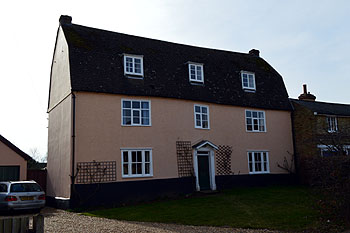The Chequers Public House Potton
The Chequers Public House: 8 Brook End, Potton
![The Chequers about 1903 [X758/1/8/120]](/CommunityHistories/Potton/Images/The Chequers about 1900 [X758-1-8-120]_351x229.jpg)
The Chequers about 1903 [X758/1/8/120]
The former Chequers, 8 Brook End, is a splendid old building. It was listed by English Heritage in November 1986 as Grade II, of special interest. It dates from the 18th century and is timber-framed with an exterior application of roughcast render. The gable ends are encased in brick and the whole exterior walls are colourwashed. The property comprises two storeys with attics beneath a tiled roof known as a gambrel.
The house seems to have been built in 1783 by John Pedley on the site of a number of cottages burned down in the Great Fire of Potton of 14 August that year (which ties in with the English Heritage dating) [HF40/2/14/17]. In 1803 the owner was Stephen Raymond because he redeemed the Land Tax on it [LS111]; the property was already called the Chequers and so may have been built as an intended licensed premises.
In 1834 ownership of the Biggleswade brewing firm of Wells and Company was conveyed from Robert Lindsell and William Hogg to Frederick Hogg and William Lindsell. The two new owners were admitted as tenants to the Chequers in 1836 [HF40/2/14/17] The property was copyhold, that is to say, it was part of the Manor of Potton Rectory. People held copyhold properties from the manor and instead of conveying them to someone else had to surrender them to the Lord of the Manor at a manor court and the new owners then had to seek admission from that manor court or a subsequent one. This allowed the manor to claim a fee (known as a fine) for the privilege.
The countywide licensing register of 1876 states that the Chequers had been licensed over a hundred years and was owned by Wells and Company. Clearly the Chequers had only been licensed 93 years or so if it was built around 1783 however, the phrase “over one hundred years” probably just means “a long time”, the register is not always accurate on the dates it gives for first licensing.
Wells and Company became Wells and Winch in 1899 when purchased by Kent businessman George Winch for his son Edward Bluett Winch. In that year the Chequers was enfranchised, that is to say, the owners paid a fine to convert it from copyhold to freehold property, free from any need to pay further fines to the manor [GH50/2]. Wells and Winch, merged with Suffolk brewers Greene King in 1961, taking that name as Greene King (Biggleswade) in 1963.
The countywide licensing register of 1903 stated that the Chequers needed repairing, it was 51 yards from the nearest licensed premises (the Bell) and had one front and two back doors. The Rating and Valuation Act 1925 specified that every building and piece of land in the country was to be assessed to determine its rateable value. Potton, like most of the county, was assessed in 1927 and the valuer visiting the Chequers [DV1/C12/98] found that the licensee had been there about a year and was "very honest" and he discovered that weekly trade consisted of three barrels and four or five dozen bottles of beer along with twenty gallons of spirits and the same amount of wine per year. All this amounted to takings of £20 per week on average. The buildings consisted of two attics with two bedrooms and a box room below and, below that, a club room, tap room, bar, kitchen and scullery and, below that, a cellar. Outside were a cart shed, a three stall stable and a barn.
In 1944 the Potton rescue car was garaged at the Chequers [WW2/AR/C/2/234]. This vehicle would have been used to carry people to the scene of any bombing raid to begin rescuing the injured; fortunately it was never needed.
This long running public house closed in 1979, just shy of two hundred years after it was built. It is now a private house.

8 Brook End February 2013
References:
- HF40/2/14/17: recital of construction: 1783;
- LS111: Certificate for redemption of Land Tax: 1803;
- CLP13: Register of Alehouse Licenses: 1822-1828;
- HF40/2/14/17: recited conveyance: 1836;
- HF143/1: Register of Alehouse Licences - Biggleswade Petty Sessional Division: 1872-1873;
- HF143/2: Register of Alehouse Licences - Biggleswade Petty Sessional Division: 1874-1877;
- HF143/3: Register of Alehouse Licences - Biggleswade Petty Sessional Division: 1878-1881;
- HF143/4: Register of Alehouse Licences - Biggleswade Petty Sessional Division: 1882-1890;
- HF143/5: Register of Alehouse Licences - Biggleswade Petty Sessional Division: 1891-1900;
- GK50/1: admission of C. S. Lindsell: 1898;
- GK1/36: sale catalogues of Wells & Company of Biggleswade 1898;
- Z1039/34/2a: conveyance: 1899;
- GK50/2: enfranchisement: 1899;
- HF143/6: Register of Alehouse Licences - Biggleswade Petty Sessional Division: 1900-1914;
- PSBW8/1: Register of Alehouse Licences - Biggleswade Petty Sessional Division: 1903-1915;
- X758/1/8/120-121: photographs of horse and carts outside public house: c.1903;
- Z1039/34/1: epitome of conveyance of adjoining land to Lindsell and Winch: 1919;
- WW2/AR/C/2/234: garaging for ambulance and converted rescue car at Chequers: 1944;
- X704/123: Chequers Savings Club: 1950s;
- PSBW8/2: Register of Alehouse Licences - Biggleswade Petty Sessional Division: 1956-1972;
- PSBW8/3: Register of Alehouse Licences - Biggleswade and North Bedfordshire Petty Sessional Divisions: 1976-1980
List of Licensees: note that this is not a complete list. Italics indicate licensees whose beginning and/or end dates are not known:
1822-1824: James Mead;
1828-1836: Elizabeth Mead;
1850: John Miles;
1853-1864: William Lunniss;
1872-1882: William Kitchin;
1891-1893: Isaac Emery;
1893-1895: Fanny Emery;
1895-1905: John Baker;
1905-1910: Thomas Hills;
1910-1924: Horace Montague;
1926-1927: Edwin H. Lewin;
1928: Jesse Beddell;
1931: Ezra Carter;
1940: Thomas Gordon;
1957: Leonard Snell;
1957-1959: Harry James Dobson;
1959-1960: Frederick George Sutton;
1960-1965: Robert Young;
1965-1966: Thomas Fish Hay;
1966-1979: Keith Desmond Bilton;
1979: Herbert Sansom
Public House closed 1979